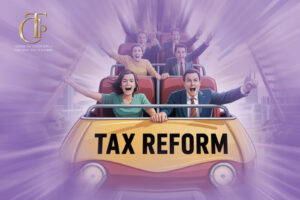 The federal government taxes large estates, but under the recent Tax Cuts and Jobs Act, (TCJA), P.L. 115-97, which went into effect January 1, 2018, the exemption for estate and gift taxes doubled – temporarily. The double exemption disappears after 2025 unless Congress extends it. There has been concern that when the exemption goes back to normal, those who took advantage of the boon might under some circumstances have to pay the piper for those taxes. This is often referred to as a “clawback”. These exemptions only affect the wealthy, but those with healthy assets will be pleased to learn that the IRS has just proposed regulations ( REG-106706-18) that clarify those who make large gifts that fall under the double exemption during the delegated period will remain tax-free and will not be taxed on that amount at any time in the future.
The federal government taxes large estates, but under the recent Tax Cuts and Jobs Act, (TCJA), P.L. 115-97, which went into effect January 1, 2018, the exemption for estate and gift taxes doubled – temporarily. The double exemption disappears after 2025 unless Congress extends it. There has been concern that when the exemption goes back to normal, those who took advantage of the boon might under some circumstances have to pay the piper for those taxes. This is often referred to as a “clawback”. These exemptions only affect the wealthy, but those with healthy assets will be pleased to learn that the IRS has just proposed regulations ( REG-106706-18) that clarify those who make large gifts that fall under the double exemption during the delegated period will remain tax-free and will not be taxed on that amount at any time in the future.
Size of Estates and Gifts Affected
Section 2010(c)(3)(A) granted an exclusion for estates and taxable gifts before January 1, 2018. The amount was for $5 million, but that was indexed for inflation after 2011. With the inflation index, the amount was $5.49 million for 2017. The Tax Cuts and Jobs Act doubled the exemption, and it amounts to $11,180,000 for a single person in 2018, and will increase to $11.4 million in 2019. Exemptions for a married couple is double yet again that of a single person. If Congress does not extend the double exemption, it ends at the end of 2025. If this happens, with inflation adjustments, the extension will most likely be approximately $6 million for individuals and $12 million for married couples.
Most financial advisers agree that the best course of action if it makes sense for the taxpayer’s overall plan, is to use the exemption for gifts before 2025. After all, if a taxpayer dies after 2025, they cannot count on the exemption still being in place for purposes of estate tax. Now, if you were planning to eventually make a large financial gift, there is an even bigger incentive, since under the proposed IRS rules there will be no clawback.
Why the Double Exemption Has Created Concerns
The basic exclusion amount (BEA) is cumulative, including both estate and gift taxes. However, the credit is applied against these two taxes differently. This has raised two concerns:
Impact of Pre-2018 Gifts
Assume a taxpayer already used their BEA and paid gift tax before the 2018 double exemption went into effect. Then they make another gift or die during the double exemption period that began January 1, 2018. Will they still get the benefit of the increased BEA for gifts made during the double exemption period, or do they lose that benefit due to gifts they made prior to 2018 on which they paid taxes? In other words, is the double exemption BEA decreased by gifts made before 2018 on which the taxpayer already paid tax? The answer is no, the increased BEA is not reduced by the gift tax the taxpayer paid on a gift before 2018.
Is There a Clawback?
The second concern has been for those who make a gift from January 1, 2018 and December 31, 2025, and do not pay taxes under the double exemption. Let’s say the gift was for $9 million, which falls below the double exemption but significantly above the usual exemption. If the giver then dies after the double exemption period expires, is any tax due on part of that gift once the BEA returns to $5 million (adjusted for inflation)? Under the proposed regulations, such gift would not be taxed if made during the increased BEA period.
The Proposed Regulations Have Yet to Have a Hearing
The clawback in particular has been of concern to tax planners. Under the proposed rules, the gifts can be made without worry of clawback. However, the rules are still in the proposal sate. A hearing on the rules will be held March 13, 2019.






